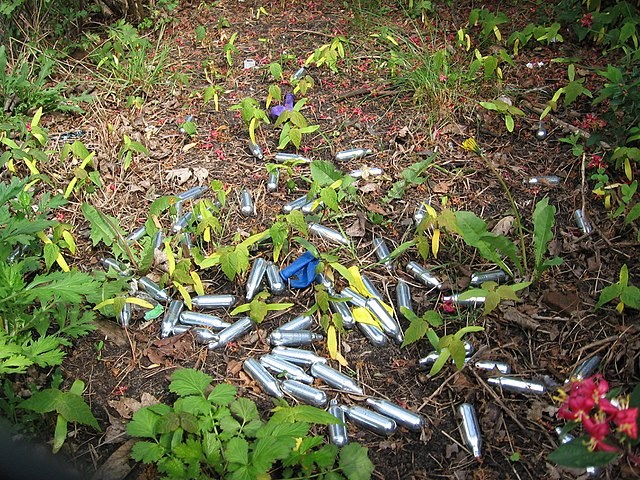Nitrous oxide, also known as laughing gas or NOS, is becoming an increasingly serious health problem across Europe, with young people inhaling the gas as a quick and often legal high.
In Belgium, and many other European countries, the leftovers from the misuse of the gas can be clearly seen on the streets. Nitrous oxide is commonly sold in small metal containers which are often dumped along pavements or the roadside in cities.
While used in a variety of legal contexts, such as dentistry or for making whipped cream, the chronic use of the psychotropic gas is leading to serious health consequences.
In its latest report, the European Monitoring Centre for Drugs and Drug Addiction states that it is “increasingly worried” about the increase in the gas’ consumption, and the number of poisonings being treated in European hospitals.
“In Denmark, the number of (poisoning) cases increased from 16 in 2016 to 73 in 2021. In France, 134 cases were reported in 2020, compared to 10 in 2017. Meanwhile, in the Netherlands, the number of cases increased from 13 in 2015… to 144 in 2020,” the report stated.
Dizzyingly high risks
Misuse of the gas can lead to a whole array of illness and injury. Firstly, the gas can disable vitamin B12 within the body, leading to potential nerve damage.
“In addition, car accidents caused by driving while either intoxicated or trying to fill balloons have significantly increased, at least in the Netherlands. Littering of used cartridges and balloons has also been highlighted as an issue,” the monitoring centre observed.
Belgium is not exceptional to this rule. Road safety institute Vias found that one in seven Belgian drivers under the age of 34 regularly uses nitrous oxide before driving, 6% having done so at least once a month.
Related News
- Police seize 1,300 laughing gas capsules during lockdown party intervention
- Nearly 3,000 laughing gas capsules seized from a vehicle by Belgian police
While the sale of nitrous oxide has been officially banned to minors as of February, the gas can still legally be misused by adults, who buy the canisters under false pretences.
In Belgium, several municipalities have enacted their own regional ban of the gas, but the gas remains widely available across the country and elsewhere, even with sweeping bans against its use in place in some EU Member States.
“The increase in recreational use of nitrous oxide in parts of Europe is concerning,” said Alexis Goosdeel, Director of the observatory. “Consumers generally feel that inhalation is safe. Yet we find that more frequent or heavier consumption of the gas increases the risk of serious harm, such as nervous system damage.”
The report recommends that EU Member States drastically disincentivize the consumption of the inhalant and take “targeted actions” to improve the understanding of risks and reduce harm.”

